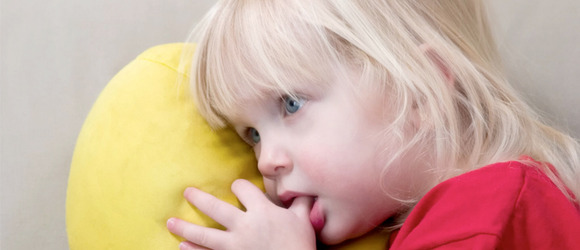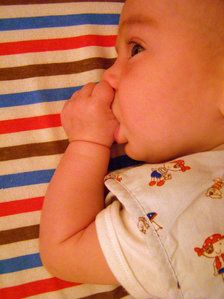
Are Thumb-Sucking and Nail-Biting Actually Good for Your Child?
If you’re like most parents, when you catch your child sucking their thumb or biting their nails, you probably try to get your child to stop those bad habits. But do these behaviors actually hurt your child? And can they actually, paradoxically, help your kid out? Recent studies imply that thumb-sucking and nail-biting will actually stimulate your child’s immune system in positive ways that can help them out when they’re older.
A Dirty Habit – And That’s Good
A lot of parents wonder if nail-biting and thumb-sucking are dirty habits. To be sure, they’re not exactly clean: Hands and fingers get everywhere, and even more attentive children aren’t really known for their stellar hygiene. When your child puts their fingers in or near their mouth, those germs get all in your kid’s mouth and are quickly introduced into your child’s body. But here’s the thing: Unless your child has a serious condition that affects their immune system, that’s probably fine.
A recent study in Pediatrics examined thumb-sucking and nail-biting as reinforcements of what scientists call “the hygiene hypothesis”: the idea that your early exposure to germs (say, in the first few years of your life) promotes immune system development, and also impedes the development of allergies. For many years, immunologists have observed that allergies seem to stem from an overactive immune system: in lieu of real threats, your body turns against things like dust, pollen, and dander, causing all the standard symptoms of allergies. Basically, if your body gets a taste of real threats, it knows what to focus on.
In the study, New Zealand researchers examined 1,000 subjects over three decades, from childhood onward. They had the children’s parents report thumb-sucking and nail-biting behaviors at the ages of 5, 7, 9 and 11. Then the researchers administered a pin-prick allergy test to all subjects at the ages of 13 and 32.
The result? 38% of people who either sucked their thumbs or bit their nails during childhood had at least one allergy later in life, compared with 49% of people who lacked the habit. Most critically, if subjects had both habits during childhood, they were less likely to develop an allergy than those with just one habit.
In other words, while thumb-sucking and nail-biting aren’t silver bullets to ensure a healthier immune system and avoid allergies, there’s strong evidence that the way they stimulate the immune system is beneficial later in life. These odd little quirks of childhood can save your kid a lot of grief later in life.
Can It Be Dangerous?
Most children’s thumb-sucking or nail-biting habits are minor and harmless. There are some dangers with excessive nail-biting or thumb-sucking, such as pain. However, if these habits move into the realm of harm, they’re generally self-correcting. If your child is sucking their thumbs raw, for instance, or biting their nails to the quick, they’ll feel pain, and the activity won’t be soothing anymore. So they’ll stop engaging in the behavior, at least to that degree or for a while.
With thumb-sucking, there’s real concern about the well-being of the teeth — but only in older children. Remember that babies and young children still haven’t gotten their permanent teeth in. Once the permanent teeth begin to erupt, these are more vulnerable to misalignments caused by the presence of a thumb in the mouth. (These misalignments are more likely to occur and more likely to be severe if the child is sucking their thumb vigorously rather than if they’re just keeping their tongue in their mouth.)
However, most children stop sucking their thumb by the time their permanent teeth begin to grow in. Be aware that if they haven’t, a pacifier or other surrogate for the thumb can cause the same misalignments of teeth.
Conclusion
If you need to help your child break the habit, remember that thumb-sucking and nail-biting are self-soothing mechanisms. Children engage in these habits because they’re feeling bored, anxious or restless, and many use it as an aid to get to sleep. Most of these behaviors stop on their own later in life.
If you need to stop your child’s behavior, don’t scold them – you’ll only succeed in upsetting your child. Instead, look into a surrogate for the behavior. Once you figure out why they’re engaging in this habit, you’ll be able to figure out how to displace your child’s energy. If they’re anxious, for instance, you might hold them and stroke them, or you might find them a blanket or a stuffed animal to cuddle. If they’re bored or restless, you can find a game or a toy for them to play with. You can also try painting a bad-tasting (but safe) liquid on your child’s fingers, or putting a bandage on their thumb, to make them more conscious of their habit.
Just remember: your child’s health isn’t a reason to stop them. Children have sturdy immune systems, and your kid is training their body in anticipation to deal with real threats, rather than the phantom threat of allergies.
So let your kid suck their thumb or bite their nails. It won’t hurt them. In fact, it might actually be healthy for them.
Handpicked Related Articles
CanadianNanny.ca is Canada’s largest and most trusted online service for finding nannies and babysitters. We have been recognized by Today’s Parent, CanadaAM, the Globe & Mail, Reader’s Digest, Canadian Living Magazine, and many reputable parenting websites and publications across Canada.

